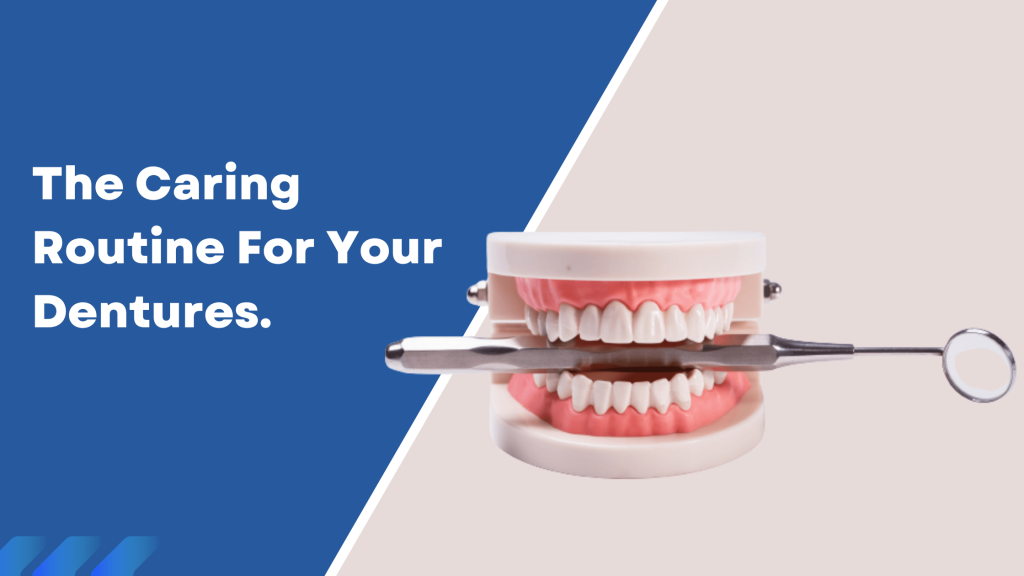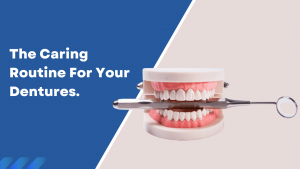Dentures are, in simple words, replacements for your natural teeth. Whether partial or complete, they are an enhancement which helps you achieve that perfect smile. Since they are performing the duties of your natural teeth, they also have to be taken care of the same way, or perhaps they require even more attention. They also must be protected from stains and decay, so a proper denture care routine is needed, for caring for your dentures.
Steps Involved in Caring for Your Dentures
Brush Them Daily
You must establish a daily routine of brushing and cleaning your dentures with a soft brush, just like your teeth, a primary step of caring for your dentures. Use an ADA-approved denture cleanser together with a soft denture brush. Gently brush them in a circle, paying attention to each area, using a little warm water. This is best done over a table or counter with a towel underneath to catch them in case they fall.
Wash Them After Eating
Run water over your dentures after meals to eliminate food debris and loose particles. If you drop your dentures, you can protect them from breaking by placing a folded towel on the counter or inside the sink. While getting acclimated to your dentures can take some time, it’s crucial to utilize them carefully while learning how to eat with them. To prevent damage and chipping, avoid taking big bites, chewing with your mouth closed, and biting down on hard objects with your front dentures.
Soak Them Overnight
Giving your mouth and dentures a break throughout the day is a beautiful idea. It’s an excellent habit to practise taking them out before bed or to remove them for at least six hours each day. Additionally, this enables the tissues in the mouth to heal. To keep bacteria from growing on them while they are out, keep them soaking in warm water if they have metal clasps, or if not, immerse them in a specific denture cleaner.
Never put a paper towel around your dentures. They might be mistaken for trash and discarded with ease. Store your dentures safely by keeping them out of the reach of children and animals—children and dogs like playing with and chewing on dentures.
Clean Them Before Putting Them in the Mouth
After using a denture-soaking solution, be sure to thoroughly rinse your dentures because it can contain dangerous chemicals that, if consumed, could result in pain, vomiting, and burns.
Maintain Good Oral Hygiene
Your general health and the proper fit and retention of your dentures depend on maintaining healthy gums. You should continue gently brushing your gums, tongue, and roof of your mouth to eliminate plaque and bacteria, even if there aren’t any teeth along the gumline. If you still have any of your natural teeth, make sure to brush them and, if you can, floss them.
Be Gentle
Do not bend or harm the clasps or the plastic when washing the dentures. Do not use anything sharp or abrasive near your dentures. Using objects like toothpicks or dental scrapers on dentures is not advised since they can easily slip and harm your oral tissue. Sterile brushes, abrasive toothpaste, and potent cleaners should all be avoided as they may damage your dentures. Hydrogen peroxide, which does not affect the color of denture teeth, is frequently found in toothpaste marketed as “whitening.”Any bleaching agents have the potential to damage dentures and change their color. Dentures containing metal attachments or parts shouldn’t be soaked in chlorine solutions since the chlorine may cause the metal to rust and tarnish. Warm water should be used to clean dentures because hot water might deform them.
Visit Your Dentist Regularly
Find out from your dentist how frequently you should get your dentures cleaned and checked. A dentist can examine your oral health and guarantee a good fit for your dentures to prevent discomfort and slippage. If you have any worries regarding your dentures, you should also call your dentist. Schedule a consultation if you
- experience discomfort
- dentures slip or are no longer adequately fitted
- create noise when you speak or eat,
- appear to be broken or worn out.
Additionally, if you experience any of the following:
- oral sores
- gum disease
- foul breath
Your dentures may no longer fit comfortably if you start to get mouth sores.
Check if They Fit Properly
Visit your dentist as soon as possible if your dentures start to lose. Loose dentures can bring on sores, inflammation, and infection.
Final Words
Since your dentures play a significant role in your daily activities, maintaining them properly is crucial if you want them to last as long as possible. Please don’t ignore them or carelessly spread them around. To keep your mouth happy and healthy, always be careful and gentle when handling them and caring for your dentures, and keep them sanitized and clean.







